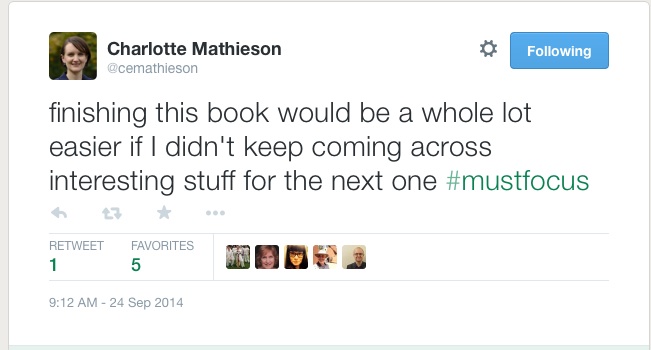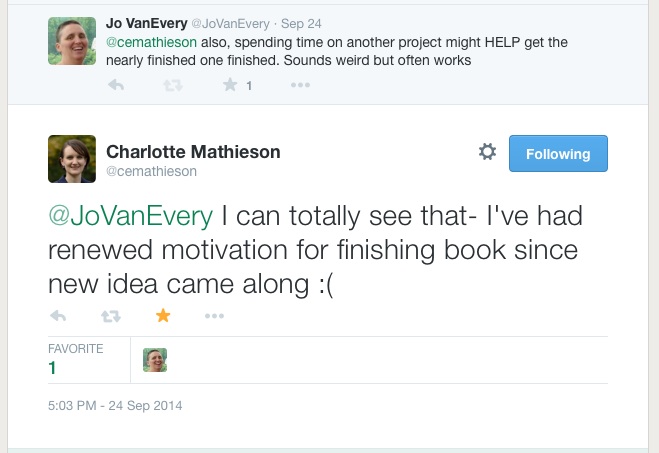This post is part of a series on Optimizing Focus. Finding it hard to focus is normal. Self-flagellation does not work to improve your focus. Furthermore it takes time and energy that takes you away from your writing; it is another distraction. I firmly believe that you can approach your work compassionately rather than violently. You do not have to go into battle in order to write. The first one, 3 elements to consider, covers the basics. Links to other posts in the series are in the Optimizing Focus Spotlight.
Have you ever felt like this?
The replies to this tweet suggest that Charlotte is not alone. Sometimes the thing that’s distracting you from your writing project is another writing project. It’s like a toddler poking you while you make dinner. And it makes it really hard to focus.
For this particular type of distraction, I usually suggest a separate document in which you note the ideas so you don’t forget them and then go back to the main project. In our Twitter conversation, Charlotte indicated that she already did that. She has a whole book with notes for the next project.
(An alternative to writing down the ideas is to send them away. There is a very funny description of this in Elizabeth Gilbert’s Ted Talk, Your Elusive Creative Genius, in which she tells a story about Tom Waits. The whole thing is worth a listen but go to 12:28 for the Tom Waits story.)
Like a toddler, those ideas weren’t poking her because they thought she was going to forget they existed. She had the book for that. The ideas were poking her because they wanted some attention.
Toddlers Ideas aren’t stupid. They can see that you have a lot going on. They know that “in a minute” or “when I finish this” is a strategy for getting them to stop poking you, not an actual commitment to giving them attention. They might stop poking temporarily, but they’ll start up again pretty soon.
Allocate time to work on the new ideas.
I know you are trying to finish this project. You have limited time for writing. Your gremlins tell you that you must devote all the writing time available to this project. They might even think that if you spend time on the new ideas you’ll be seduced by them and never finish this first thing.
 Your gremlins are worried that you are going to run off after the shiny new thing, especially at a time when what remains to be done on the thing-that-you-need-to-finish includes a lot of fiddly annoying details like checking the references.
Your gremlins are worried that you are going to run off after the shiny new thing, especially at a time when what remains to be done on the thing-that-you-need-to-finish includes a lot of fiddly annoying details like checking the references.
At least one of your gremlins was brought up in a religious sect that is highly suspicious of joy and thinks that unpleasant work is the key to heaven; the kind where not only should you always save your dessert for last but should limit dessert to a couple of special occasions a year.
The fact is you can’t concentrate on the-thing-you-need-to-finish because of the poking.
You don’t have to allocate a lot of time to the new ideas but it might be a good idea to allocate some. Put it in your calendar. And then keep that appointment. (Toddlers Ideas hate it when you make a commitment and then blow them off. They get more insistent with the poking and might escalate to full scale temper tantrums.)
Here’s what I told a client who had a similar issue:
This project is crucial to your motivation. You may not be able to give it lots of time, but you can give it priority in the sense that it can get a bit of your best creative time each day. You mentioned that after lunch was a good time for you. Experiment with working on this project for 30 minutes after lunch every day. You can even think of it as an extension of your lunch break if that helps you establish the habit. Set a timer. Stop at 30 minutes and jot down notes of what you would do next. It’s okay if you are mid-paragraph. Be willing to be surprised by how much progress you make over a week or a month.
You’ll need to adapt this to your own situation. The important elements to consider are:
- Allocate good quality creative time, whenever that is for you.
- Limit the amount of time. Use a timer. (Meditation timers make nicer alarm sounds.)
- Make it a habit. Once a day. Once a week. Whatever. Try to make it the same (day and) time.
- It’s an experiment. Clarify what you want to happen. Observe what really happens. Tweak to improve.
(You could also use the 15 minute per day Academic Writing Challenge for the new project, scheduling longer blocks of time for your almost-finished project.)
There may be other benefits to your main project.
Here are some alternative points of view. See if any of them resonate with you.
Finishing a project can be like stepping off a cliff … into a void. You end up procrastinating through perfectionism, or finding it hard to sit down and do what appear to be simple things for reasons that you just can’t figure out. By starting a new project, you eliminate the void. It’s like the next runner in a relay race starting to run beside you before you pass off the baton.
Working on the thing that is most exciting can give you energy for other things. Your energy builds and then you can use it to get more done on other projects. This is particularly helpful when the stuff that remains to be done on the almost finished project is stuff that drains your energy.
When you combine those two, there is also the sense that your excitement to really dig into the new project will motivate you to get that almost-finished one actually finished so you can give it more time. Maybe that’s just an extension of the relay metaphor in that having your fresh team-mate running alongside you can keep you running faster instead of slowing down as you approach the finish line.
I suggested the general principle to Charlotte and she agreed. (She corrected that incongruous sad face to a smiley one!)
Related posts
One thing at a time: uses a knitting analogy to expand on the benefits of having multiple projects on the go at once
Liz Gloyn’s post on The proper care and feeding of academic otters
Optimizing Focus: 3 elements to consider
This post was originally written in 2014. It has been edited and added to the October 2021 Spotlight on Optimizing Focus.











Leave a Reply